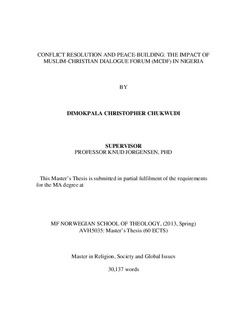| dc.description.abstract | Many scholars like Haynes 2007, Korieh 2005, Ashafa and Wuye 1999 have understood
the conflicts that have been going on in Nigeria to be religious conflicts between Muslims
in the North and Christians in the South.
Firstly, I want to argue in my research that, the Nigerian conflicts are more than religious
conflicts. Rather, they involve political, economic, social, cultural, ethnic aspects, and
problem of regionalism in the country which implicates itself with religion most of the
time to fight their cases. Meaning that, the three major regions in Nigeria (North, West,
and East) are rivals with one another because each region wants to control the Nigerian
federal government posts. Therefore, other regions with minority positions in the federal
government seats, automatically becomes rivals to the leading region, and this is what I
called the problem of regionalism. The above statement conforms to the words of Toyin
Falola that “the first Republic was defined by the politics of regionalism. The North was
dominated by the Hausa's/Fulani's, the West by the Yoruba's, and the East by the Igbo's.
The three regions were bitter rivals and they all wanted to control the federal
government” (Falola 2001:21).
Secondly, I shall present the impacts of the Muslim-Christian Dialogue Forum in Nigeria,
which is an interfaith religious organisation working to create dialogue and peace-
building in the Nigerian conflict.
The final aim of this study is to make available relevant research knowledge on some of
the issues that have been neglected during conflict resolution and peace-building in
Nigeria which are some of the major causes of conflicts in Nigeria and to urge the
Nigerian Government and other institutions that would be involved in resolving the
conflicts in Nigeria to deal with these areas in the pursuit of a better future of our country
Nigeria. | no_NO |
